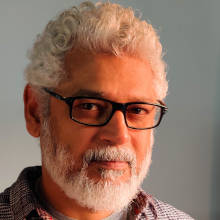[Photograph by Taty2007 under Creative Commons]
I spent about three months of the last year researching what went wrong with the National Spot Exchange Ltd, the electronic commodities trading platform built by Jignesh Shah within his Financial Technologies group. In mid-2013, the exchange was shut down by regulators who suspected most of the trading was a façade hiding an unofficial financing business.
Eventually Shah went to jail and though he is now out on bail, the business empire he erected is in a shambles. The government was resolute and regulatory action came in such a heaving gush that it shook the foundations of the FT group. The last nail is the government's decision to invoke a never-before-used provision in the companies' law to merge NSEL with FT. It would transfer the liabilities of the subsidiary to the parent which could likely make the group insolvent, ending, at least for the time being, Shah's entrepreneurial journey that began from the western Mumbai suburb of Kandivali.
Why did it happen? Why did Shah not become the poster boy of post-liberalisation India? After all, he built a multi-billion business empire and was ranked 81st on the Forbes list of the rich. A friend, who lives not far from where Jignesh Shah lived in Kandivali, told me that her family was very upset when Shah was put in jail. She felt it was okay even if he had done a little bit wrong because he had created a lot of wealth. She is also among the many who believe that it is a waste paying tax because the government is incapable of using it wisely. They believe more in enterprise and respect anyone who can build one.
Individual enterprise was not stitched into the nationalist fabric of post-Independence India unlike, say, America whose primary business is business. Although a minority still kept the flame of entrepreneurship alive in socialist India, they were never seen as ideal citizens and it took a certain chutzpah to persevere. As journalist Shankkar Aiyar writes in Accidental India, "since it became independent in 1947, India had believed in the mythological power of the state to deliver prosperity".
Not that private industry did something to pose a counter-argument. Aiyar writes that until the late sixties public savings were hoarded by banks—they were private then—and they supported only a few favoured clients with capital. Of 5,111 bank branches in 1963, only 657 were in rural India. Then, in 1969, Indira Gandhi nationalised banks. If the soul of entrepreneurship is ideas and innovation, the lifeblood is capital. The flow was now firmly controlled by the state.
1991 changed all that. Manmohan Singh heralded a new era the centerpiece of which would be entrepreneurship. Unfortunately, despite being in positions of power for long, Singh was unable to dismantle the legacy of unwieldy and restrictive regulatory architecture built over many years of unimaginative, often reactive, legislation.
A Chennai-based venture capitalist described it as a legacy of "uncoordinated regulation". He believes India's regulatory framework is based on a jail principle; intended to stop criminality, not encourage enterprise. While the characterization is largely true it is not entirely the government's fault. The closed nature of the economy bred oligopolistic tendencies and established powerful linkages between a few industrialists, administrators and lawmakers. Those who followed had to willy-nilly fall into the same pattern of doing business or face elimination.
Jignesh Shah, for instance, had hired a dozen people who had served the government and given them important executive positions in his companies. The main job of these high-profile recruits was to navigate the labyrinthine government systems and keep the company ahead of regulators.
The commodities regulator, the Forward Markets Commission, tucked away in a mouldy building in an obscure corner of Mumbai itself was a woefully incompetent and rather toothless body completely out of sync with modern markets. The sector itself was the fiefdom of the powerful union minister Sharad Pawar.
Shah managed to position NSEL in such a way that although it functioned in plain sight of several regulators, no one was really overseeing it.
Coal block allocations are another example of rules creating unusual situations, requiring even state-run companies to find workarounds. A newspaper report recently revealed the true nature of some joint venture contracts that appeared nonsensical. One state government corporation and a miner had signed an agreement which expressly stated that the miner would pay a penalty if it failed to get a mine allotted from the central ministry. It clearly showed that the corporation wanted a mine, by hook or crook, but being a government entity it needed a partner who could do the dirty work.
While researching the NSEL story, many people both in the government as well as outside admitted that Shah had built a great technological platform. Indeed, he had outsmarted some of the best technology companies in the business, both in writing software as well as selling it. But many people also talked about greed, profiteering, political intrigue and regulatory capture. The conflict between regulators and entrepreneurs in India is a vicious cycle, a Catch-22 that needs to be broken.
It is unlikely that even if governments put in their best efforts they will be able to resolve many problems through regulation or non-regulation. One of the first steps to ease doing business that the Aam Aadmi Party government in Delhi has taken is to do away with a consent certificate from the state pollution control authority for small and medium enterprises. The AAP's economic philosophy rests on the belief that free people act honestly. The party perhaps believes that those who set up small factories would be responsible enough to make them as green as possible.
It now becomes the responsibility of the entrepreneur to show good faith. In fact, in India the entrepreneur would need to show that he is willing to go the extra mile—abide by the spirit of cooperation and shoulder the responsibilities of a modern corporate citizen. But it is likely that the cost of being a company that is sensitive to its environment is high and most small companies may consider it unaffordable.
On his recent visit to India, Michael Bloomberg, chairman of the $9-billion Bloomberg LP told an interviewer that he is consulting lawyers to see whether the company would be obligated to its employees for posting them in unhealthy environments and whether he should take them out.
I am willing to wager that no Indian industrialist has ever thought about pollution from that perspective. Perhaps that is also because they share the environment with their employees. It then becomes their collective suffering. As for Bloomberg, he lives in a city that is far cleaner than Delhi, Mumbai, Jakarta or Beijing. Yet, it is clear that he is thinking about the issue from the perspective of both his employees as well as the implications for the company.
Successful entrepreneurs are good at envisioning the future to some extent. But often they restrict their thinking to their own organizations, forgetting the milieu in which they operate. It is perhaps time business leaders, big or small, have a more holistic approach to their business. After many years they have a friendly government in power which believes that business has a central role in nation-building. When businesses do more as citizens, they can justifiably demand for light-touch regulation.


